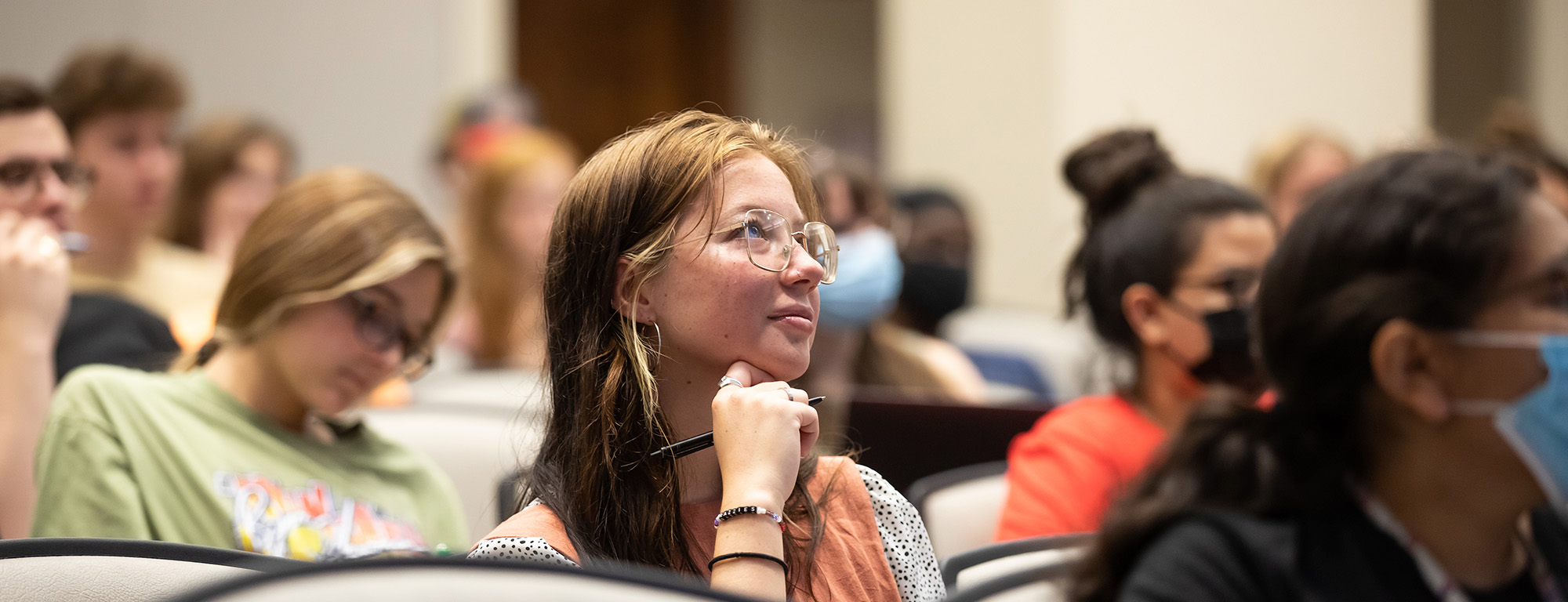
Graduate ProgramsMasters Degrees
Biological Sciences
Biology, M.S.
Explore Program
Microbiology, M.S.
Explore Program
Chemistry and Biochemistry
Chemistry, M.S.
Explore Program
Classical and Modern Languages and Literatures
Languages and Cultures, M.A.: Applied Linguistics Concentration
Explore Program
Languages and Cultures, M.A.: Classics Concentration
Explore Program
Languages and Cultures, M.A.: German Concentration
Explore Program
Romance Languages, M.A.: French or Spanish Concentration
Explore Program
Economics
Economics, M.A. (Non-Thesis Option)
Explore Program
Economics, M.A. (Thesis Option)
Explore Program
English
English, M.A.
Explore Program
Technical Communication, M.A.
Explore Program
Creative Writing, M.F.A.
Explore Program
Environmental Toxicology
Environmental Toxicology, M.S.
The M.S. program (36 hours) is composed of coursework emphasizing the principles of toxicology, the environmental fate of chemicals, statistical approaches to study design, data handling, and data analysis, and seminars in environmental toxicology. Supplemental coursework, research, and thesis hours are chosen by the student with the guidance of their committee, allowing for focus on the student’s particular research emphasis. Master’s students must perform an original research project, prepare a written thesis, and defend their work in a public defense.
Research areas include Aquatic Toxicology, Ecotoxicology, Human Health Sciences, Environmental
Chemistry, Biochemical and Molecular Toxicology, Infectious Disease Research, Wildlife
Toxicology, Fibers, Protective Textiles, and Countermeasures to Chemical Toxins, among
others.
Explore Program
Forensic Science, M.S.
The Master of Science in Forensic Science degree program emphasizes extensive learning in the scientific and laboratory skills necessary for application in a modern forensic laboratory. The program offers concentration focuses in areas of forensic investigation and includes exposure to the breadth of forensic disciplines, including the principles, practices, and contexts of science as they relate to specialized forensic topics.
Graduates from this program are prepared to enhance and strengthen the forensic science
disciplines through sound methodologies and practices while simultaneously advocating
the highest ethical standards through public service to federal, state, and local
law enforcement jurisdictions and agencies.
Explore Program
Forensic Science, M.S.: Forensic Professional Concentration
The program’s Forensic Professional Concentration is designed for currently employed forensic professionals, provides career development with a flexible online delivery platform amenable to the working environment. This degree is designed for those individuals currently working in a forensic science field such as law enforcement, medical examiner offices, legal, or forensic science laboratory settings to improve the current level of mastery which may lead to supervisory roles and promotion.
The program offers both theoretical and practical coursework and is designed to allow
students to emphasize areas of special interest such as crime scene investigation,
scene reconstructions, and forensic science management.
Explore Program
Geosciences
Atmospheric Science, M.S.
Explore Program
Geography and the Environment, M.S.
Explore Program
Geosciences, M.S.
Explore Program
History
History, M.A.
Explore Program
Kinesiology and Sport Management
Kinesiology, M.S.
Explore Program
Kinesiology, M.S.: Exercise Physiology Concentration
Explore Program
Sport Management, M.S.
Explore Program
Mathematics and Statistics
Mathematics, M.A. (Non-Thesis Portfolio Option)
Explore Program
Mathematics, M.A. (Non-Thesis Report Option)
Explore Program
Mathematics, M.A. (Thesis Option)
Explore Program
Mathematics, M.S. (Non-Thesis Exam Option)
Explore Program
Mathematics, M.S. (Non-Thesis Report Option)
Explore Program
Mathematics, M.S. (Thesis Option)
This M.S. program consists of 30 hours of graduate work that includes 24 hours of coursework (a minimum of 18 hours in mathematics/statistics) and 6 hours of credit for the master’s thesis.
Explore ProgramStatistics, M.S. (Non-Thesis Exam Option)
This program consists of 36 hours of graduate work and passing two departmental Prelim Exams in statistics.
Explore ProgramStatistics, M.S. (Non-Thesis Report Option)
Explore Program
Statistics, M.S. (Thesis Option)
This Master of Science program consists of 36 hours of graduate work that includes
6 hours of credit for the master’s thesis. A thesis defense is required.
Explore Program
Philosophy
Philosophy, M.A.
The master’s degree program is aimed at providing a broad background in philosophy while encouraging complementary work in an approved minor field of study.
The student may choose to complete 24 hours of graduate coursework plus 6 hours of
thesis research. Alternatively, the student may complete 33 hours of graduate coursework
and then take an oral exit examination over a significant research paper. Up to one
third (but no more than 9 hours) of the student’s coursework may consist of graduate
courses in disciplines other than philosophy, subject to the approval of the departmental
graduate advisor.
Explore Program
Physics and Astronomy
Physics, M.S. (Course-Based Option)
Explore Program
Physics, M.S. (Exam-Based Option)
Explore Program
Physics, M.S. (Thesis Option)
Explore Program
Political Science
Political Science, M.A.
Explore Program
Public Administration, M.P.A.
The program provides students with a public service perspective to do the following:
- to lead and manage in public governance;
- to participate in and contribute to the policy process;
- to analyze, synthesize, think critically, solve problems, and make decisions;
- to articulate and apply a public service perspective;
- to communicate and interact productively with a diverse and changing workforce and citizenry.
Explore Program
Psychological Sciences
Experimental Psychology, M.A.
Psychology, M.A.
Sociology, Anthropology, and Social Work
Anthropology, M.A.
Thesis Option. Students in the anthropology program are strongly encouraged to write a thesis, particularly if they plan to continue their studies in a doctoral program.
Non-Thesis Option. Students choosing the non-thesis option are required to take 36 hours of coursework (including 9 core hours and 27 elective hours, which may include 6 hours outside of anthropology).
Explore Program
Sociology, M.A.
Students in the sociology program may select the thesis option or non-thesis option. The thesis option is strongly recommended for students who plan to continue their graduate studies by applying to a doctoral program.
Explore Program
Social Work, M.S.W.
Explore Program
College of Arts & Sciences
-
Address
Texas Tech University, Box 41034, Lubbock, TX 79409-1034 -
Phone
806.742.3831 -
Email
arts-and-sciences@ttu.edu
